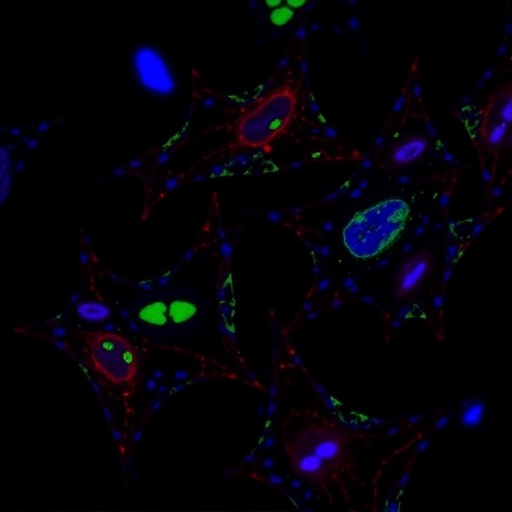A groundbreaking study released in Nature Biomedical Engineering has unveiled a critical connection between congenital heart disease and kidney function, specifically highlighting the role of genetic variants in the SMAD2 gene. Congenital heart disease (CHD), a complex condition generally arising from malformations in heart structures during fetal development, is frequently seen alongside a host of multi-organ complications. Among these, kidney-related issues such as glomerulosclerosis, interstitial fibrosis, and albuminuria have become an area of increasing concern for clinicians and researchers alike. This study not only sheds light on the intricate interplay between heart and kidney pathologies but also paves the way for future regenerative therapies.
The research underscores that congenital heart disease is not merely a cardiac condition but has systemic implications that affect organ systems far removed from the heart itself. One particularly compelling aspect is the observation that patients with SMAD2 variants tend to exhibit more severe manifestations of kidney impairments. But what is the underlying mechanism driving this intriguing relationship? The study posits that pathogenic variants in SMAD2 could directly impact kidney cell fate, leading to developmental anomalies and impaired organ function.
To delve deeper into these mechanisms, the researchers employed a multifaceted approach, integrating CRISPR technology for disease modeling, along with human induced pluripotent stem cell (iPSC) techniques. This cutting-edge framework allowed them to create models that accurately reflect the pathological conditions associated with CHD and SMAD2 mutations. By doing so, they could track cellular development in a controlled environment, offering unprecedented insights into podocytogenesis—the formation of podocytes, essential for kidney function.
Podocytes are specialized epithelial cells that form part of the glomerular filtration barrier, pivotal for maintaining the kidney’s ability to filter blood effectively. The research team’s findings were alarming; upon introducing the SMAD2 mutations, podocyte development was severely disrupted. The normal processes of cellular arborization and interdigitation, which are crucial for creating a functional filtration barrier, were hampered. This revelation points toward a fundamental flaw in how kidney cells are responding to the SMAD2 genetic alterations.
In an innovative twist, the authors utilized a glomerulus-on-a-chip, a microfluidic model that simulates real glomerular function. This advanced technology allowed researchers to observe the physiological responses of kidney cells under controlled conditions, serving as an invaluable tool in understanding the impact of the SMAD2 genetic variants. Notably, the study revealed substantial albumin leakage from these mutant podocytes, providing a direct correlation to clinical manifestations of glomerulopathies in patients.
The implications of these findings extend beyond theoretical knowledge. The relationship between congenital heart disease and kidney malformations suggests a potential pathway for new therapies focused on reversing these developmental abnormalities. Understanding the pathways affected by SMAD2 mutations could serve as a starting point for targeted regenerative strategies, aimed at restoring normal kidney architecture and improving overall organ function in affected patients.
Additionally, the study raises intriguing questions about the role of genetic screening in clinical settings. The potential for identifying at-risk patients through genetic variants could pave the way for earlier interventions. By monitoring those with SMAD2 mutations, clinicians could tailor treatment strategies to address both cardiac and renal aspects of congenital heart disease simultaneously, enhancing patient outcomes.
Moving forward, the research accentuates the urgent need for interdisciplinary collaboration between cardiologists, nephrologists, and geneticists. The interconnectedness of organ systems necessitates a holistic healthcare approach, particularly for conditions like congenital heart disease that manifest widespread impacts. Future studies will undoubtedly build on this foundational research, investigating the full spectrum of organ interactions and genetic influences.
In conclusion, this study represents a significant leap forward in our understanding of congenital heart disease and its far-reaching implications for renal health. The links established between SMAD2 mutations and kidney cell abnormalities open up new avenues for research and treatment, offering hope for those affected by these conditions. As science continues to unravel the complexities of genetic diseases, this work serves as a testament to the power of innovative research methods in uncovering crucial biological insights.
As we delve deeper into the genetic underpinnings and functional consequences of congenital heart disease, it’s evident that further exploration is required. It stands to reason that the interplay of genetics and environmental factors could also play a critical role, providing fertile ground for future investigations. Researchers are now tasked with not only validating these findings but also expanding upon them to chart a course towards targeted therapeutic interventions.
The significance of this research resonates across the biomedical community, as we strive to illuminate the multifaceted complexities of congenital conditions. By bridging the gap between cardiac and renal pathology, this work empowers healthcare professionals with a more comprehensive understanding of their patients’ challenges. As science progresses, the hope is for these insights to directly inform clinical practice and improve the lives of countless individuals facing congenital heart disease.
As the study catalyzes discussions within the scientific community, it also raises awareness among patients and families who navigate the complexities of congenital heart disease. With a deeper understanding of the genetic factors involved, there may be newfound hope for tailored therapies and improved quality of life.
Subject of Research: The role of SMAD2 genetic variants in congenital heart disease and their impact on kidney function.
Article Title: Engineered human induced pluripotent stem cell models reveal altered podocytogenesis in congenital heart disease-associated SMAD2 mutations.
Article References:
Bhattacharya, R., Ward, T., Kalejaiye, T.D. et al. Engineered human induced pluripotent stem cell models reveal altered podocytogenesis in congenital heart disease-associated SMAD2 mutations.
Nat. Biomed. Eng (2025). https://doi.org/10.1038/s41551-025-01543-0
Image Credits: AI Generated
DOI: https://doi.org/10.1038/s41551-025-01543-0
Keywords: congenital heart disease, SMAD2, kidney function, podocytogenesis, regenerative therapies, genetic variants.
Tags: albuminuria and heart disease connectioncongenital heart disease and organ complicationsCRISPR technology in disease modelinggenetic impact on kidney cell fateglomerulosclerosis and genetic variantsinterstitial fibrosis in CHD patientsmultifaceted research approaches in biomedical engineeringNature Biomedical Engineering study on SMAD2podocytogenesis and kidney healthregenerative therapies for heart and kidney issuesSMAD2 mutations and kidney functionsystemic implications of congenital heart disease





